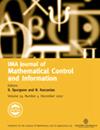Periodic event-triggered formation control of multi-agent systems via complex Laplacian
IF 1
4区 计算机科学
Q3 AUTOMATION & CONTROL SYSTEMS
IMA Journal of Mathematical Control and Information
Pub Date : 2024-01-29
DOI:10.1093/imamci/dnad035
引用次数: 0
Abstract
The event-triggered formation control of first-order continuous multi-agent systems is studied based on complex Laplacian in this paper. Periodic event-triggered control is designed in which continuous communication between agents is not required. For each agent, two different triggering conditions are discussed. The first one relies on the inter-neighboring communication at each verification time, while the second one only need the broadcast states of neighbors at their triggering instants. According to the Lyapunov stability theory and algebraic graph theory, consensus conditions on the verification period and parameters in the triggering conditions are also provided. It is demonstrated that the maximum verification period under two triggering conditions are two times larger than the existing results. And a certain amount of communication between neighbors can be further reduced in the second one. Finally, the simulation examples prove the validity of the results proposed.通过复杂拉普拉卡方实现多代理系统的周期性事件触发编队控制
本文基于复拉普拉卡矩研究了一阶连续多代理系统的事件触发编队控制。本文设计了周期性事件触发控制,其中不要求代理之间进行连续通信。对于每个代理,本文讨论了两种不同的触发条件。第一种触发条件依赖于每次验证时间的邻域间通信,而第二种触发条件只需要邻域在触发时刻的广播状态。根据李雅普诺夫稳定性理论和代数图论,还提供了验证周期的共识条件和触发条件中的参数。结果表明,两个触发条件下的最大验证周期是现有结果的两倍。而且在第二种情况下,邻居之间的通信量可以进一步减少。最后,仿真实例证明了所提结果的正确性。
本文章由计算机程序翻译,如有差异,请以英文原文为准。
求助全文
约1分钟内获得全文
求助全文
来源期刊
CiteScore
3.30
自引率
6.70%
发文量
33
审稿时长
>12 weeks
期刊介绍:
The Journal is to provide an outlet for papers which are original and of high quality in mathematical control theory, systems theory, and applied information sciences. Short papers and mathematical correspondence or technical notes will be welcome, although the primary function of the journal is to publish papers of substantial length and coverage. The emphasis will be upon relevance, originality and clarify of presentation, although timeliness may well be an important feature in acceptable papers. Speculative papers that suggest new avenues for research or potential solutions to unsolved problems of control and information theory will be particularly welcome. Specific application papers will not normally be within the remit of the journal. Applications that illustrate techniques or theories will be acceptable. A prime function of the journal is to encourage the interplay between control and information theory and other mathematical sciences.
All submitted papers will be judged on their merits by at least two referees and a full paper report will be available to the intending authors. Submitted articles will in general be published in an issue within six months of submission. Papers should not have previously published, nor should they be undes consideration for publication in another journal. This Journal takes publication ethics very seriously. If misconduct is found or suspected after the manuscript is published, the journal will investigate the matter and this may result in the article subsequently being retracted.

 求助内容:
求助内容: 应助结果提醒方式:
应助结果提醒方式:


